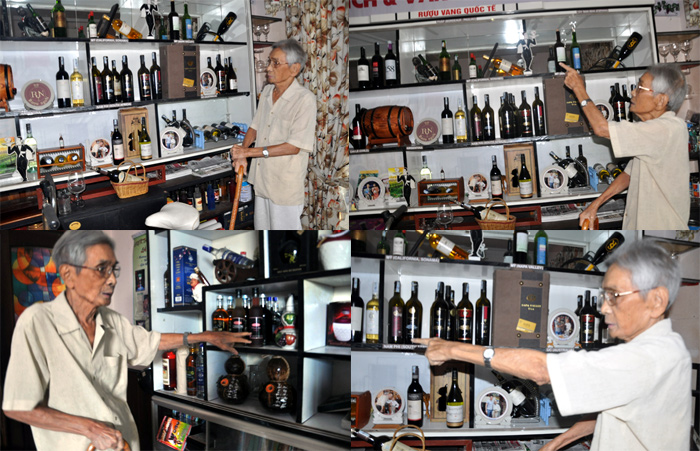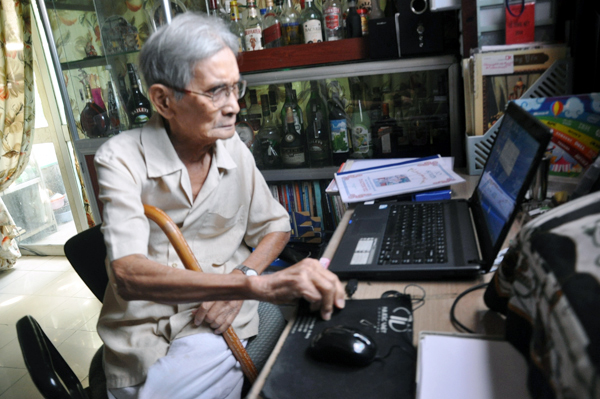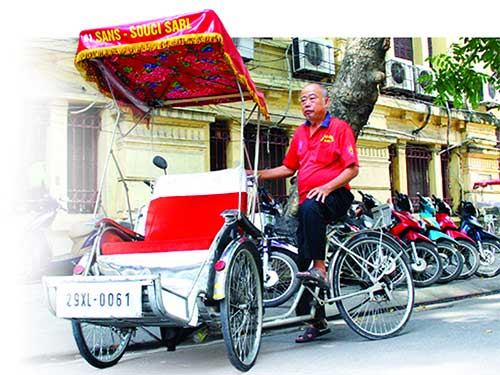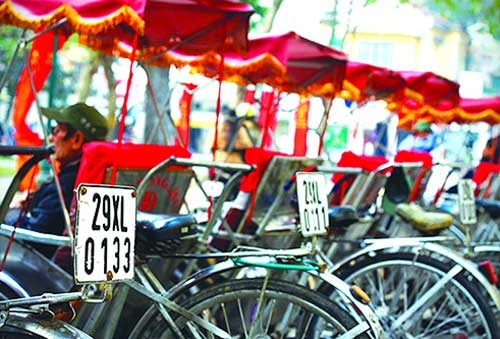Internationally known elderly Vietnamese
The names of many old people are known not only domestically but also internationally.
 |
| Madam Khanh. |
Many foreign visitors to the ancient town of Hoi An cannot forget the taste of the banh mi offered by Mrs. Nguyen Thi Loc, 80 years old.
Nobody knows when Loc received the name "Madam Khanh - The Banh Mi Queen" (115 Tran Cao Van Road, Hoi An).
“This name was created by foreign tourists. They told me that this is the best bread shop in the world," Mrs. Loc told VietNamNet.
This shop has existed for nearly 60 years. The shop is named after Loc’s husband, Mr. Khanh.
The shop is located under a narrow eave, just enough for two tables and a glass cupboard. On the front size of the cupboard is a sign saying "Madam Khanh - The Banh Mi Queen".
 |
"Some interpreters who accompanied foreign tourists told me that 'The Banh mi Queen' means the 'queen of bread'. I’m shy about that compliment. I’m happy to see my diners eating with gusto," she said.
On TripAdvisor, a popular forum for worldwide travelers, one can see hundreds of positive comments from tourists about Madam Khanh’s bread.
Mrs. Loc said she sells about 200 loaves of bread each day, earning profit of around VND1 million (nearly US$50).
"It is so hard to earn that amount of money. My whole family has to get up at 4 am. All of the bread is made by myself and my daughter," she said.
Banh Mi prepared by "Madam Khanh" looks no different from other banh mi, but you will feel the difference after a few bites.
95-year old bartender in Danang
 |
The copyright of more than 20 books on cocktail-mixing techniques by teacher Nguyen Xuan Ra were given to Danang’s Dong A University during its celebrations to mark the 31st anniversary of Vietnamese Teacher's Day last year (20 November).
The 95-year-old teacher, who has lived at 37 Ngo Gia Tu Street for 19 years, is very famous in Vietnamese culinary culture. He is considered to be Vietnam’s first-ever artisan with impressive experience in dispensing soft drinks, and even a “wizard” among Vietnam’s cocktail makers.
Ra’s copyrighted books were compiled during his 20 years of teaching at the Hanoi Travel and Tourism Training School. Some of them focus on waiter/waitress skills and competencies, whilst others feature mixing techniques and selected recipes to create delicious international and Vietnamese-style cocktails. The aim is to provide readers with useful references for their cocktail making.
After retiring in 1996, Ra decided to live in Danang with his daughter, and helped her to open a bar named Aloha in Ngo Gia Tu Street’s Hoang Yen Hotel. At that time, this local bar attracted a large number of visitors thanks to Ra’s impressive cocktail-mixing talents. Most notably, apart from Vietnamese guests, the venue became popular with many foreigners.
 |
| Mr. Ra and his wine cabinet. |
When visiting the bar, customers were deeply impressed by the unique and delicious tastes of its drinks. Amongst them were Jacques Marnier from France, along with Aid and Kipping from the Netherlands. After enjoying cocktails at Aloha, the three foreigners, who are known wine experts, contacted Ra to exchange and share their tips and experiences of creating cocktails.
Since then, Kipping has kept in touch with Ra and presented him with a number of useful reference documents which have helped the old man improve his skills.
Over the 1997-1998 period, Danang saw many bars opening and, as a result, many people decided to learn cocktail mixing from Ra.
In an attempt to promote mass production of Vietnamese ingredients for use in cocktails, in late 2012 the old teacher cooperated with the Hanoi Liquor Joint Stock Company (Halico) to produce many different kinds of wine. These included vodka, brandy, and whisky, along with liqueurs flavored with coffee, anise and cherries.
The owner of Nhu Lan Bakery, Ho Chi Minh City
 |
| Mrs. Dau |
Located on a busy corner of District 1's pretty Ham Nghi neighborhood, Nhu Lan Bakery has been famous for its fresh, flavorful bread since it opened in 1972.
The bakery's owner, Nguyen Thi Dau, started her career by selling bread on a small pushcart. By that time, sandwiches had become a popular and convenient snack for city-dwellers. Vietnam's French-style baguettes were the key to the success of the Vietnamese sandwich, or banh mi. The bread was soft, but also firm and often a little salty. It was most commonly served with soup, meat or fish.
But in those days, it was not uncommon to see Saigonese munching on plain bread as well.
Dau made her bread less salty than other varieties and her bakery became known for its thicker, spongier insides, and crispier crusts. The flavor hasn't changed much over the decades, but these days, there's more meat. Nhu Lan's sauces aren't oily and their pâté is delicious and super-fatty.
Apart from the bread, the bakery boasts a variety of other snacks, like cassava steamed with coconut juice and served with sesame salt, a favorite of both locals and foreigners. Nhu Lan's rice cracker with pork floss has also made a name for itself.
For breakfast, those who don't want bread can also enjoy bún mắm (rice vermicelli with fermented fish broth) and bún riêu (shrimp crab tomato soup with rice vermicelli).
Nhu Lan also sells head cheese, roasted duck, roasted chicken with honey, and roasted suckling pig as well as sweet desserts such as grilled banana.
Nhu Lan Bakery also produces many vegetarian cakes as well as low-fat varieties.
However, Nhu Lan Bakery is the most famous among foreign tourists for its banh mi.
The King of Sans Souci cyclo service, Hanoi
 |
| Mr. Do Anh Thu. |
In the bustle of people and vehicles in the Old Quarter of Hanoi, cyclos travel along the streets to create a unique culture to the 1,000 year old city.
Cycles were imported into Vietnam from 1939; they have become one of the vehicles familiar to old Hanoi.
Hanoi expatriates are often nostalgic about the language "Loong coong" of pedicabs, along with the pitch of the hawkers and flavor of the rolls and Thanh Tri, Ho Tay shrimp cakes.
Cheap, convenient, friendly and comfortable, today, the cabs are often chosen as an international tourist transportation while visiting Hanoi. The old town has narrow streets, and sometimes no sidewalks. Instead of a pedicab, guests can feel comfortable sitting on a lounge chair and watch the busy market area of the "three-six streets in Hanoi."
Pedicabs can go through a small alley. Guests can request a complete stop anywhere they want to walk, sightseeing, photography and shopping.
The city has four companies specializing in providing travel services cyclo: Sans Souci, Huy Phong, Hotel Métropole and cultural tourism company, but the most famous is Sans Souci of Mr. Do Anh Thu, 65, who is regarded as the saviour of the cyclo.
With 129 pedicabs, Sans Souci companies still lead this type of service. At least 70% of the company's customers come from French-speaking countries, 25% from English speaking countries, and the remaining 5% come from Asian countries like Japan, the Republic of Korea, Hong Kong and Singapore.
 |
Sans Souci cyclo was honored to serve the Czech Republic Prime Minister Milos Zeman, the delegation accompanying French President Jacques Chirac, guests attending the Asia-Europe Summit (ASEM 5), and some embassy staff in Hanoi such as France and the Netherlands.
“Maybe because it was the first cyclo company in the world. Perhaps it is more special because I graduated from the Hanoi National University of Education.
Hard times pushed me to find a temporary job to earn a living when my history degree could not help. No one ever imagined that I would stay so strongly attached to this career. Last but not least, I gave my company a unique French name: Sans Souci – No worries!" Thu said.
